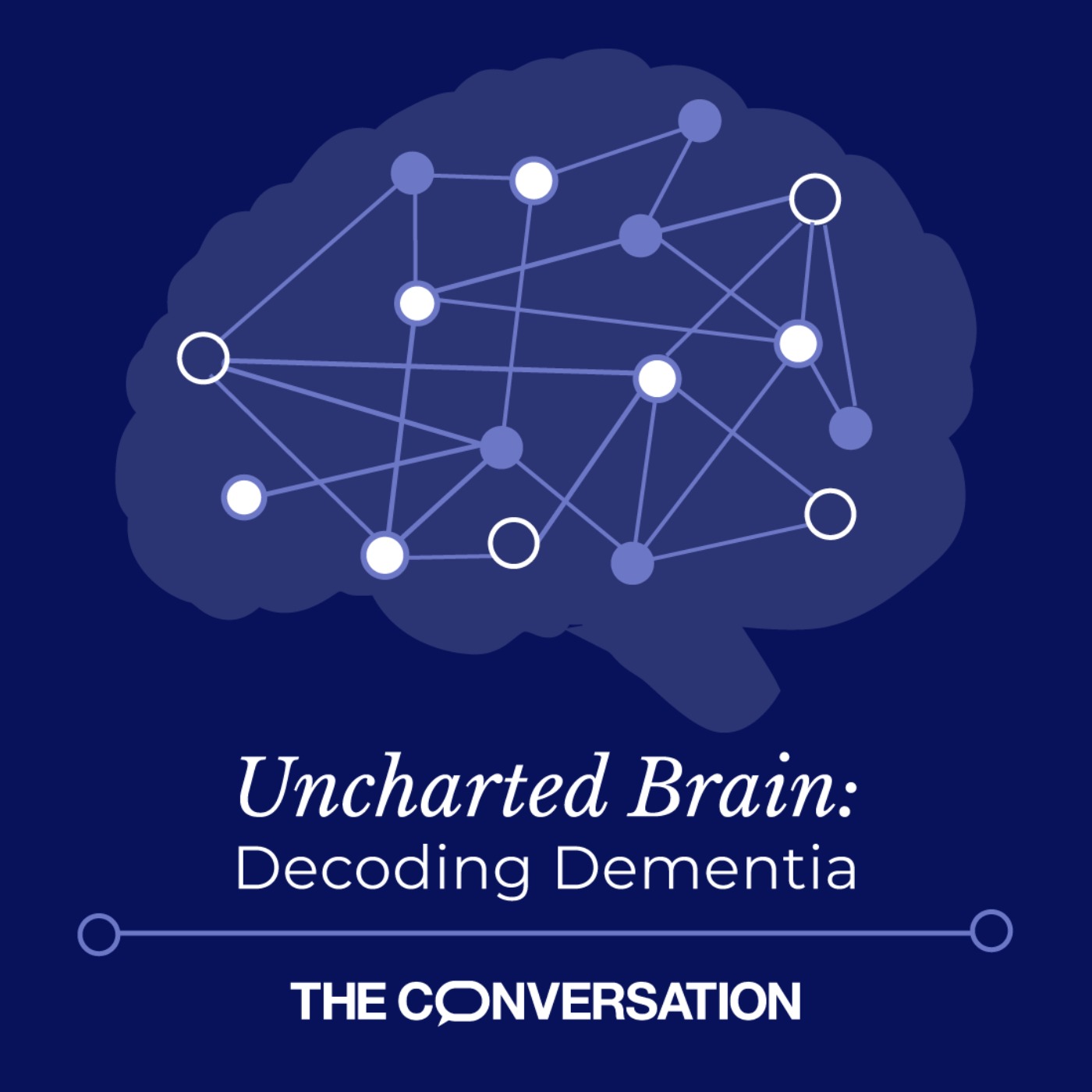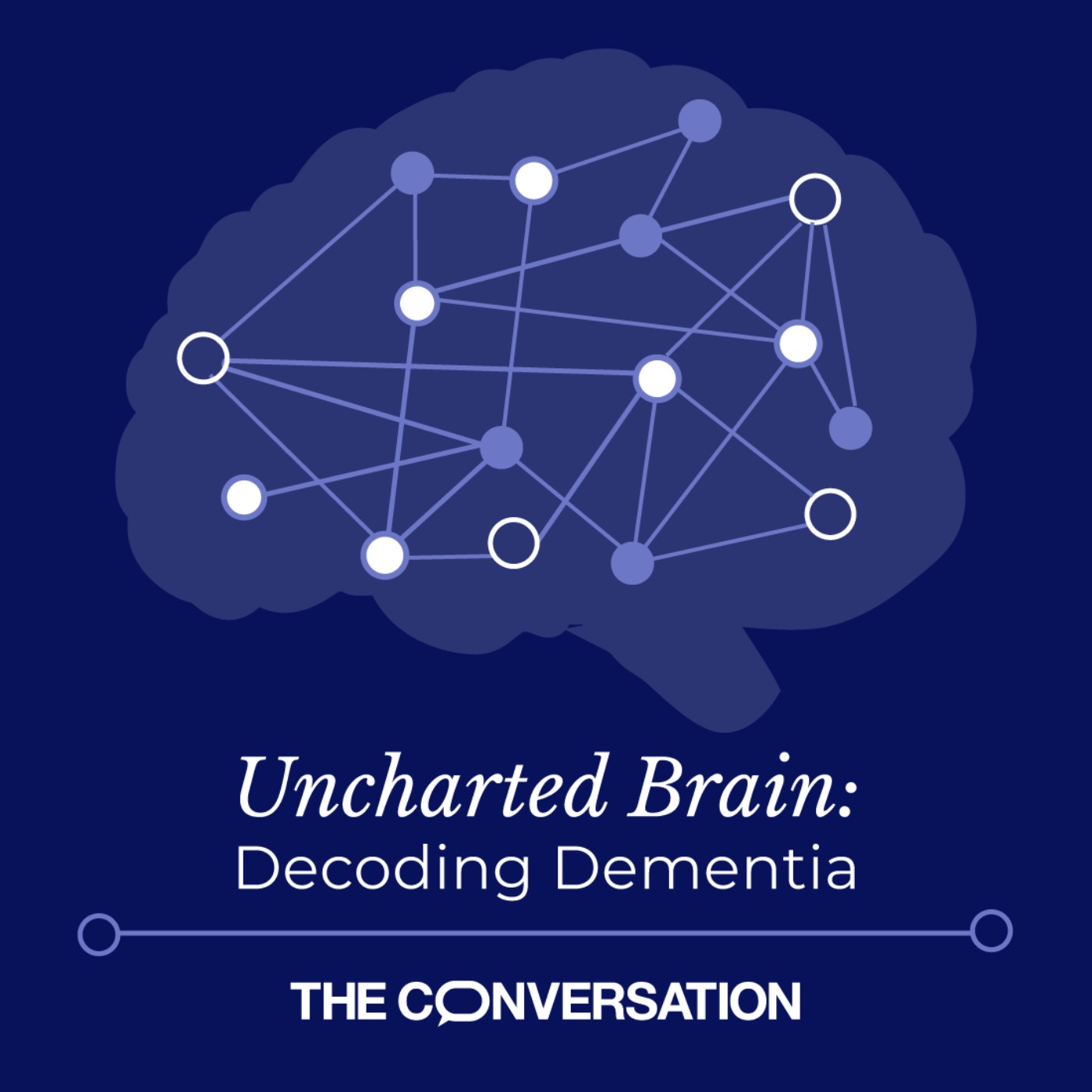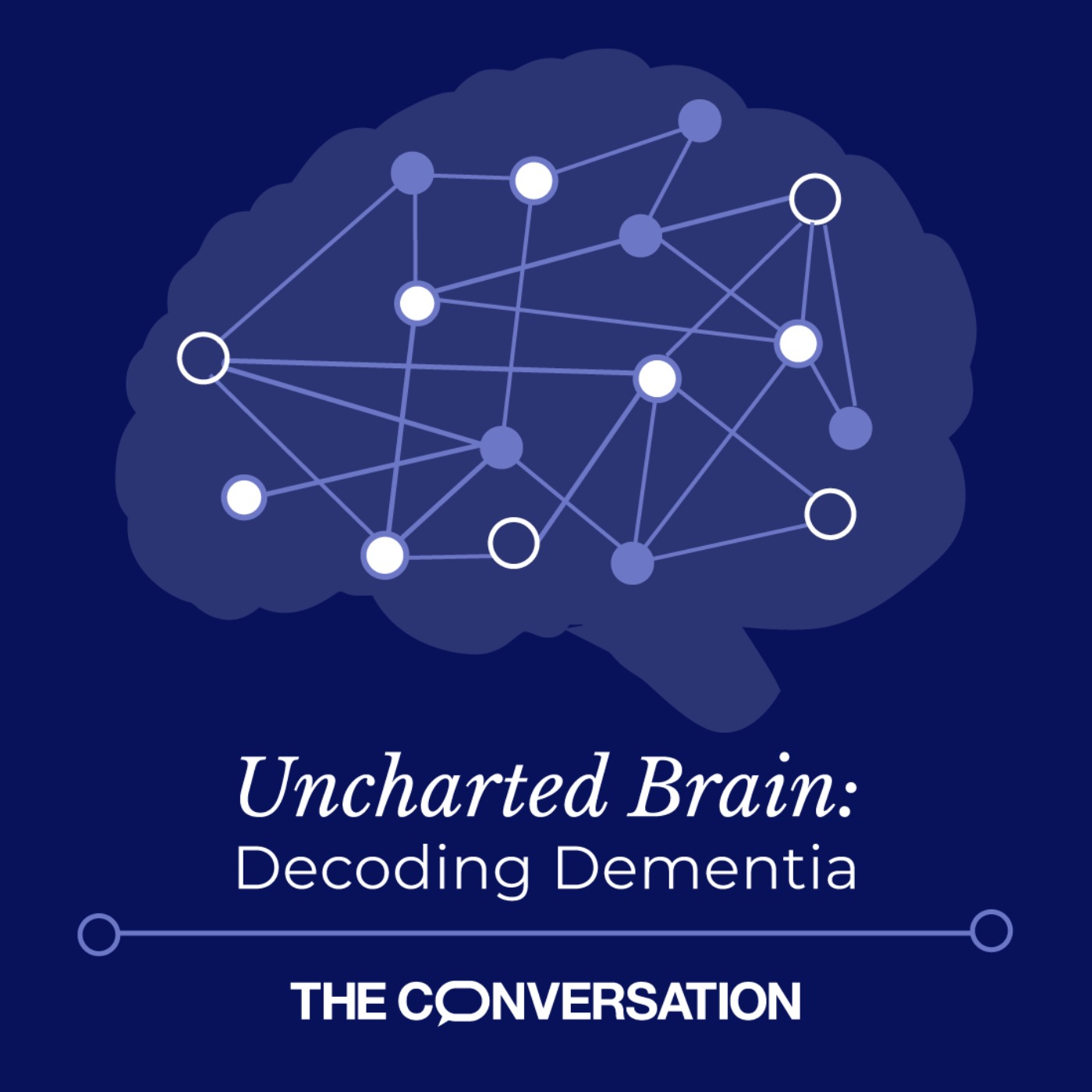Discover The Making of an Autocrat
The Making of an Autocrat

The Making of an Autocrat
Author: The Conversation
Subscribed: 2,495Played: 94,747Subscribe
Share
© Licenced as Creative Commons – attribution, no derivatives.
Description
The Conversation Documentaries (formerly The Anthill) is podcast from The Conversation. Our documentary series cover everything from science to the environment, politics, culture and economics. We unearth new stories from the world of academia and talk to experts to shed light on some of the big questions of today. The Conversation is a not-for-profit independent media organisation and our journalists work with academics to help share their research knowledge with as many people as possible.
94 Episodes
Reverse
We used to have a pretty clear idea of what an autocrat was. History is full of examples: Adolf Hitler, Joseph Stalin, Mao Zedong, along with Vladimir Putin and Xi Jinping today. The list goes on.So, where does Donald Trump fit in?In this six-part podcast series, The Making of an Autocrat, we are asking six experts on authoritarianism and US politics to explain how exactly an autocrat is made – and whether Trump is on his way to becoming one.
Every day that he was locked up in a scam compound in Southeast Asia, George thought about how to get out. "We looked for means of escaping, but it was hard," he said. Scam Factories is a podcast series taking you inside Southeast Asia's brutal fraud compounds. It accompanies a series of multimedia articles on The Conversation.In our third and final episode, Great Escapes, we find out the different ways survivors manage to escape, what it takes for them to get home, and what is being done to clamp down on the industry. This podcast series first aired in February 2025 on The Conversation Weekly. In June 2025 it won Best Investigative Podcast at the Publisher Podcast Awards. The series was written and produced by Gemma Ware with production assistance from Katie Flood and Mend Mariwany. Sound design by Michelle Macklem. Leila Goldstein was our producer in Cambodia and Halima Athumani recorded for us in Uganda. Hui Lin helped us with Chinese translation. Editing help from Justin Bergman and Ashlynee McGhee. Getting out of Southeast Asia's scam factoriesFrom empty fields to locked cities: the rise of a billion-dollar criminal industry‘We could hear the screams until midnight’: life inside Southeast Asia’s brutal fraud compounds
A few weeks after Ben Yeo travelled to Cambodia for what he thought was a job in a casino, he found himself locked up in a padded room. “It’s a combination between a prison and a madhouse,” he remembers. He was being punished for refusing to conduct online scams.Scam Factories is a podcast and multimedia series taking you inside Southeast Asia's brutal fraud compounds. The Conversation collaborated for this series with three researchers: Ivan Franceschini, a lecturer in Chinese Studies at the University of Melbourne, Ling Li, a PhD candidate at Ca' Foscari University of Venice, and Mark Bo, an independent researcher. In the second episode, Inside the Operation, we explore the history of how scam compounds emerged in Southeast Asia and who is behind them. We hear about the violent treatment people receive inside through the testimonies of two survivors, Ben, and another man we're calling George to protect his real identity. This podcast series first aired in February 2025 on The Conversation Weekly. In June 2025 it won Best Investigative Podcast series at the Publisher Podcast Awards. The series was written and produced by Gemma Ware with production assistance from Katie Flood and Mend Mariwany. Sound design by Michelle Macklem. Leila Goldstein was our producer in Cambodia and Halima Athumani recorded for us in Uganda. Hui Lin helped us with Chinese translation. Editing help from Justin Bergman and Ashlynee McGhee. Rise of an industry: part 2 of Scam FactoriesLocked in: the inside story of Southeast Asia's fraud compounds
Scam factories is a special three-part series taking you inside Southeast Asia's brutal fraud compounds. Hundreds of thousands of people are estimated to work in these scam factories. Many were trafficked there and forced into criminality by defrauding people around the world.The Conversation collaborated for this series with three researchers: Ivan Franceschini, a lecturer in Chinese Studies at the University of Melbourne, Ling Li, a PhD candidate at Ca' Foscari University of Venice, and Mark Bo, an independent researcher. In episode 1, our researchers travel to a village in Cambodia called Chrey Thom to see what these compounds look like. And we hear from two survivors about how they were recruited into compounds in Laos and Myanmar. This podcast series was first aired in February 2025 on The Conversation Weekly podcast. In June 2025 it won Best Investigative Podcast series at the Publisher Podcast Awards. The series was written and produced by Gemma Ware with production assistance from Katie Flood and Mend Mariwany. Sound design by Michelle Macklem. Leila Goldstein was our producer in Cambodia and Halima Athumani recorded for us in Uganda. Hui Lin helped us with Chinese translation. Editing help from Justin Bergman and Ashlynee McGhee. Locked in: the inside story of Southeast Asia's fraud compounds‘It seemed like a good job at first’: how people are trafficked, trapped and forced to scam in Southeast Asia – Scam Factories podcast, Ep 1
The neglect of working-class voters in the past few decades has had profound consequences for British political life. Disillusioned with the two main parties, many have turned to Nigel Farage’s Reform and others are simply not voting at all. With the next election likely to be a tight race in many key constituencies, something must be done to win these voters back.But as we find out in this fifth and final part of Know Your Place: what happened to class in British politics, the relationship between class and voting could be about to become even more complicated. So it’s difficult for any party to know how to put an electoral coalition together. Featuring, Geoffrey Evans, professor in the sociology of politics at the University of Oxford, John Curtice, senior research fellow at the National Centre for Social Research, Oliver Heath, professor of politics at Royal Holloway University of London, Paula Surridge, professor of political sociology at the University of Bristol, Rosie Campbell, director of the Global Institute for Women’s Leadership at King's College London and Vladimir Bortun, lecturer in politics at University of Oxford.The Conversation Documentaries, formerly The Anthill podcast, is home to in-depth audio series from The Conversation UK, a not-for-profit independent news organisation. Find out more and donate here. And consider signing up for Politics Weekly, an essential briefing on the big stories of the week from The Conversation UK's politics and society team.Further reading: The true class divide in British politics is not which party people choose, but whether they vote at allWhy the Tories may be wasting their time trying to compete with ReformClass identity: why fancy freebies are a bigger political problem for this Labour government than its Tory predecessors
After the 2024 election, the British parliament looks very different, with a large Labour majority for the first time in more than a decade. Several cabinet ministers come from working-class backgrounds, including the prime minister, deputy prime minister and foreign secretary. What impact will the upbringing of this new parliament have on the way Britain is governed?In the fourth part of Know Your Place: what happened to class in British politics, we examine the link between representation and political change and ask will Britain's new look parliament herald meaningful reform?Featuring Rosie Campbell, director of the Global Institute for Women’s Leadership and professor of politics at King's College London, Vladimir Bortun, lecturer in politics at the University of Oxford, former Labour MP David Hanson, now Baron Hanson of Flint and current Labour MP Jeevun Sandher.The Conversation Documentaries, formerly The Anthill podcast, is home to in-depth audio series from The Conversation UK, a not-for-profit independent news organisation. Find out more and donate here. And consider signing up for Politics Weekly, an essential briefing on the big stories of the week from The Conversation UK's politics and society team.Further reading: Can Kemi Badenoch claim to have ‘become working class’ while working in McDonald’s – and why would she want to?Beyond ‘my dad was a toolmaker’: interviews with former politicians reveal what it’s really like to be working class in parliament Class identity: why fancy freebies are a bigger political problem for this Labour government than its Tory predecessors
In the third part of Know Your Place: what happened to class in British politics, we explore how class is defined and measured, and how the UK’s changing class identity interacts with identity politics. Featuring Daniel Evans, lecturer in criminology, sociology and social policy at Swansea University, Gillian Prior, deputy chief executive of the National Centre for Social Research, John Curtice, senior research fellow at the National Centre for Social Research, Oliver Heath, professor of politics at Royal Holloway University of London, Paula Surridge, professor of political sociology at the University of Bristol and Tim Bale, professor of politics at Queen Mary University of London.Know your place is a series supported by the National Centre for Social Research. It's produced and mixed by Anouk Millet for The Conversation. Full credits available here.The Conversation Documentaries, formerly The Anthill podcast, is home to in-depth audio series from The Conversation UK, a not-for-profit independent news organisation. Find out more and donate here. And consider signing up for Politics Weekly, an essential briefing on the big stories of the week from The Conversation UK's politics and society team.Further reading: Can Kemi Badenoch claim to have ‘become working class’ while working in McDonald’s – and why would she want to?Deliveroo judgment shows how gig economy platforms and courts are eroding workers’ rightsAge, not class, is now the biggest divide in British politics, new research confirms
In the second episode of Know Your Place: what happened to class in British politics, host Laura Hood, senior politics editor at The Conversation, looks back at a century of class in British politics to understand why Tony Blair's decision to move Labour away from the working class was such a watershed moment. Featuring Mark Garnett, senior lecturer in politics at Lancaster University, Martin Farr, senior lecturer in contemporary British history at Newcastle University and Tim Bale, professor of politics at Queen Mary University of London. Plus interviews with former Labour MPs Reg Race and David Hanson, who is now a member of the House of Lords and minister of state for the Home Office.Know your place is a series supported by the National Centre for Social Research. It's produced and mixed by Anouk Millet for The Conversation. Full credits available here.The Conversation Documentaries, formerly The Anthill podcast, is home to in-depth audio series from The Conversation UK, a not-for-profit independent news organisation. Find out more and donate here. And consider signing up for our free daily newsletter.Further readingCan Kemi Badenoch claim to have ‘become working class’ while working in McDonald’s – and why would she want to?Age, not class, is now the biggest divide in British politics, new research confirmsThatcher helped people to buy their own homes – but the poorest paid the price
In the first episode of our new podcast series Know Your Place: what happened to class in British politics, host Laura Hood, senior politics editor at The Conversation, explores when the relationship between class and voting broke down and why. Featuring John Curtice, professor of politics at the University of Strathclyde and senior research fellow at the National Centre for Social Research, Paula Surridge, professor of political sociology at the University of Bristol, Tim Bale, professor of politics at Queen Mary University of London and Geoffrey Evans, professor in the sociology of politics at the University of Oxford. Know your place is a series supported by the National Centre for Social Research. It's produced and mixed by Anouk Millet for The Conversation. Full credits available here. The Conversation Documentaries, formerly The Anthill podcast, is home to in-depth audio series from The Conversation UK, a not-for-profit independent news organisation. Find out more and donate here. And consider signing up for our free daily newsletter. Further readingAge, not class, is now the biggest divide in British politics, new research confirmsBrexit identities: how Leave versus Remain replaced Conservative versus Labour affiliations of British votersUK election: Reform and Green members campaigned more online – but pounded the pavements less
The relationship between class and political preference in Britain used to be clear cut – Labour for the working class, the Conservatives for the middle class. But not any more. In a new five-part series, Know your place: what happened to class in British politics, Laura Hood, senior politics editor at The Conversation, explores what fractured the relationship between class and voting in the UK, and why no politicians can take the working class vote for granted. The first episode launches on October 7.Know your place is a series supported by the National Centre for Social Research. It's produced and mixed by Anouk Millet for The Conversation. The Conversation Documentaries, formerly The Anthill podcast, is home to in-depth audio series from The Conversation, a not-for-profit independent news organisation. Find out more and donate here.
We’re changing our name, from The Anthill, to The Conversation Documentaries! Over the last few years we’ve used The Anthill podcast to run in-depth series on a range of issues. And that’s exactly what we’ll keep on doing. But we’re changing our name to better reflect that what you’re listening to are documentaries from The Conversation. We’re a not-for-profit independent news website and our editors work with academics to help share their expertise and research with as many people as possible.In the next few weeks we’ll be launching a new limited series about British politics. So keep following The Conversation Documentaries, and watch this space for our latest trailer, coming soon.
The quest for a theory of everything – explaining all the forces and particles in the universe – is arguably the holy grail of physics. While each of our main theories of physics works extraordinarily well, they also clash with each other. But do we really need a theory of everything? And are we anywhere near achieving one?Featuring Vlatko Vedral, a professor of physics at the University of Oxford and Chanda Prescod-Weinstein, an assistant professor in physics and astronomy and core faculty in women's and gender studies at the University Of New Hampshire.This episode is presented by Miriam Frankel and produced by Hannah Fisher. Executive producers are Jo Adetunji and Gemma Ware. Social media and platform production by Alice Mason, sound design by Eloise Stevens and music by Neeta Sarl. A transcript is available here. Sign up here for a free daily newsletter from The Conversation.Further reading: The standard model of particle physics may be broken – an expert explains
What’s the difference between a living collection of matter, such as a tortoise, and an inanimate lump of it, such as a rock? They are, after all, both just made up of non-living atoms. The truth is, we don’t really know yet. Life seems to just somehow emerge from non-living parts.Featuring Jim Al-Khalili, professor of physics at the University of Surrey, and Sara Imari Walker, professor of physics at Arizona State University.This episode is presented by Miriam Frankel and produced by Hannah Fisher. Executive producers are Jo Adetunji and Gemma Ware. Social media and platform production by Alice Mason, sound design by Eloise Stevens and music by Neeta Sarl. A transcript is available here. Sign up here for a free daily newsletter from The Conversation.Further reading: Life: modern physics can’t explain it – but our new theory, which says time is fundamental, might
It is hard to shake the intuition that there's a real and objective physical world out there. If I see an umbrella on top of a shelf, I assume you do too. And if I don't look at the umbrella, I expect it to remain there as long as nobody steals it. But the theory of quantum mechanics, which governs the micro-world of atoms and particles, threatens this commonsense view.Featuring Chiara Marletto, Research Fellow of Physics, and Christopher Timpson, Professor of Philosophy of Physics, both at the University of Oxford, and Marcus Huber, Professor of Physics, TU Wien.This episode is presented by Miriam Frankel and produced by Hannah Fisher. Executive producers are Jo Adetunji and Gemma Ware. Social media and platform production by Alice Mason, sound design by Eloise Stevens and music by Neeta Sarl. A transcript is available here. Sign up here for a free daily newsletter from The Conversation.Further reading: 'QBism': quantum mechanics is not an objective description of reality – it reveals a world of genuine free will
Interest in the multiverse theory, suggesting that our universe is just one of many, has spiked since the movie Everything Everywhere All At Once was released. The film follows Evelyn Wang on her journey to connect with versions of herself in parallel universes to stop the destruction of the multiverse. The multiverse idea has long been an inspiration for science fiction writers. But does it have any basis in science? And if so, is it a concept we could ever test experimentally? Featuring Andrew Pontzen, professor of Cosmology at University College London, Katie Mack, Hawking chair in cosmology and science communication at the Perimeter Institute for Theoretical Physics, and Sabine Hossenfelder, research fellow of physics at the Frankfurt Institute for Advanced Studies. This episode is presented by Miriam Frankel and produced by Hannah Fisher. Executive producers are Jo Adetunji and Gemma Ware. Social media and platform production by Alice Mason, sound design by Eloise Stevens and music by Neeta Sarl. A transcript is available here. Sign up here for a free daily newsletter from The Conversation.Further reading: The multiverse: how we're tackling the challenges facing the theoryCurious Kids: how likely is it that there are parallel universes and other Earths?The multiverse: our universe is suspiciously unlikely to exist – unless it is one of many
Imagine a universe with extremely strong gravity. Stars would be able to form from very little material. They would be smaller than in our universe and live for a much shorter amount of time. But could life evolve there? It after all took human life billions of years to evolve on Earth under the pleasantly warm rays from the Sun. Now imagine a universe with extremely weak gravity. Its matter would struggle to clump together to form stars, planets and – ultimately – living beings. It seems we are pretty lucky to have gravity that is just right for life in our universe.Featuring Fred Adams, professor of physics, University of Michigan, and Paul Davies, professor of physics, Arizona State University.This episode was presented by Miriam Frankel and produced by Hannah Fisher. Executive producers are Jo Adetunji and Gemma Ware. Social media and platform production by Alice Mason, sound design by Eloise Stevens and music by Neeta Sarl. A transcript is available here. Sign up here for a free daily newsletter from The Conversation.Further reading: The multiverse is suspiciously unlikely to exist unless it is one of many
Without a sense of time, leading us from cradle to grave, our lives would make little sense. But on the most fundamental level, physicists aren't sure whether the sort of time we experience exists at all. We talk to three experts and find out if time could potentially be moving backwards as well as forwards. Featuring Sean Carroll, Homewood professor of natural philosophy at Johns Hopkins University, Emily Adlam, postdoctoral associate of the philosophy of physics at Western University and Natalia Ares, Royal Society university research fellow at the University of Oxford.This episode was presented by Miriam Frankel and produced by Hannah Fisher. Executive producers are Jo Adetunji and Gemma Ware. Social media and platform production by Alice Mason, sound design by Eloise Stevens and music by Neeta Sarl. A transcript is available here. Sign up here for a free daily newsletter from The Conversation.Further reading: Quantum mechanics: how the future might influence the pastFour misconceptions about quantum physics
There are many competing theories about what causes Alzheimer's disease. For more than 30 years, Ruth Itzhaki has been accumulating evidence that viruses are involved in its development in the brain. We investigate this evidence in the third and final episode of Uncharted Brain: Decoding Dementia, hosted by Paul Keaveny and Gemma Ware from The Conversation.Featuring interviews with Ruth Itzhaki, professor emeritus of molecular neurobiology at the University of Manchester in the UK, Dana Cairns, a postdoctoral research fellow at Tufts University in the US and Davangere P. Devanand, director of geriatric psychiatry and professor of psychiatry and neurology, Columbia University Medical Center in the US.Uncharted Brain is produced by Tiffany Cassidy with sound design by Eloise Stevens. The executive producer is Gemma Ware. Read full credits here. Further reading:My work investigating the links between viruses and Alzheimer’s disease was dismissed for years – but now the evidence is building
Dementia doesn’t just affect older people. Chronic traumatic encephalopathy (CTE) is a form of dementia that athletes from a whole range of sports can develop. It’s now at the centre of a number of legal challenges involving sports from rugby to American football. In the second episode of Uncharted Brain: Decoding Dementia, hosts Gemma Ware and Paul Keaveny from The Conversation find out about the toll this type of dementia can take on family members, who are often unaware of what’s happening to their loved ones.This episode features interviews with Matthew Smith, a senior lecturer in sport and exercise psychology at the University of Winchester in the UK and Lisa McHale, director of family relations at the Concussion Legacy Foundation.Uncharted Brain is produced by Tiffany Cassidy with sound design by Eloise Stevens. The executive producer is Gemma Ware. Read full credits here. Further reading:Sport-induced traumatic brain injury: families reveal the ‘hell’ of living with the condition
Scientists have been doing an array of regular health checks on the same group of people since they were born in 1946 – the world's longest running cohort study. Now the brains of some of its participants are revealing new insights into the risk factors for Alzheimer's disease. We find out more in the first episode of Uncharted Brain: Decoding Dementia, a new series from The Anthill hosted by Paul Keaveny and Gemma Ware from The Conversation.This episode features Marcus Richards, professor of psychology in epidemiology, UCL, Jonathan Schott, professor of neurology at UCL and David Ward, one of the cohort study participants.Uncharted Brain is produced by Tiffany Cassidy with sound design by Eloise Stevens. The executive producer is Gemma Ware. Read full credits here. Further reading:We’ve been studying the same people for 76 years – this is what we’ve found out about Alzheimer’s disease














In the evolving landscape of personalized medicine, the link between patient-specific needs and tailored treatments grows stronger. A prime example lies in the realm of orthopedics, where products like Synvisc-One are revolutionizing joint care. As seen at https://medwholesalesupplies.com/product/synvisc-one-8mg-ml-1-6ml-prefilled-syringe/, this hyaluronic acid injection offers relief to those battling osteoarthritis. Its formulation, adapted to individual requirements, underscores a shift towards customized healthcare solutions. This marks just the beginning of a promising journey into a realm where medicine is truly made for you.
💚CLICK HERE Full HD>720p>1080p>4K💚WATCH>ᗪOᗯᑎᒪOᗩᗪ>LINK> 👉https://co.fastmovies.org
shock therapy my ass , the west pushed money into east and funked them up . international monetary fund can suck big D .
I really enjoy the Anthill - unusual and smart look at a wide variety of topics, usually surprising. I always take away some interesting facts that feed my conversation. Makes me feel more intelligent :)
Fascinating podcast, especially about tbe deep ocean and the search for alien life - both topics looked at with very smart angle.